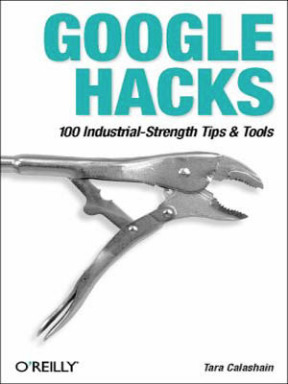As you know, the Web has a wealth of information at your fingertips, and all you need to know is how to find it. That is not always as easy as it sounds. Its common to have hit and miss results from this huge, shifting mass of data that makes up the Web; sometimes its useful and credible and sometimes its way off the mark.
Google is one of my favorite research tools. It indexes more than 2.4 billion Web pages, and conducts about 150 million searches a day. The key to good information from Google is to know how to zero in on exactly what you need.
A book entitled “Google Hack: 100 Industrial-Strength Tips and Tricks” is a collection of scripts that you can use to become instantly more effective in your research. Each hack (as the authors call it) can be read in just a few minutes, but can save hours of searching for the right answers, and helps you have fun while doing it.
Rael Dornfest is the books co-author. Hes also a researcher at O’Reilly & Associates, program chair of the O’Reilly Emerging Technology Conference, chair of the RSS-DEV Working Group, and developer of Meerkat: An Open Wire Service.
Rael talked to me and passed on advice to make surfing Google much more effective:
DANA GREENLEE: You came up with about 100 techniques to extract information from Google. Run through the most popular techniques.
RAEL DORNFEST: Google returns such intuitive results that it almost knows what youre looking for. But there are times when you want to alter your query slightly so you can hone your results. There are some really advanced syntaxes that are not documented. You can do phonebook queries and reverse phonebook queries by putting in a phone number and Google will spit back who the phone number belongs to. If you know a phrase but you dont know who said it, you can use “wild cards”. You can play around with word order or repetition. You can try to narrow down where the sources for your results come from. For example, if you wanted to hear what individuals, as opposed to news sources, say about the war in Iraq, your query can say youre only interested in weblogs. Thats done with a little bit of social engineering, noticing that most weblogs have a little button or text at the bottom of the page that says “powered by Blogger” or “powered by Movable Type.” Your query could say “Iraq war powered by Blogger.”
GREENLEE: What are Google Web APIs?
DORNFEST: Google API is a beta Web program that lets developers easily find and manipulate information on the Web. Theyre API – thats a programmatic interface to their database that allows your scripts to get access to Googles database in much the same manner as a human word through the Web interface. One example is capturing a moment in time. You can use the date range syntax to return results for a particular date in time. Theres even a little Java application that allows you to visualize the results. It actually goes to the Google API, gives data results and shows them in this sort of weird floating format that you can move around in and click on things and zoom in.
“Google Hacks” is written by Tara Calishain and Rael Dornfest and is published by O’Reilly & Associates ($24.95). For more information about Rael Dornfest, check out his weblog called raelity bytes at http://www.raelity.org







